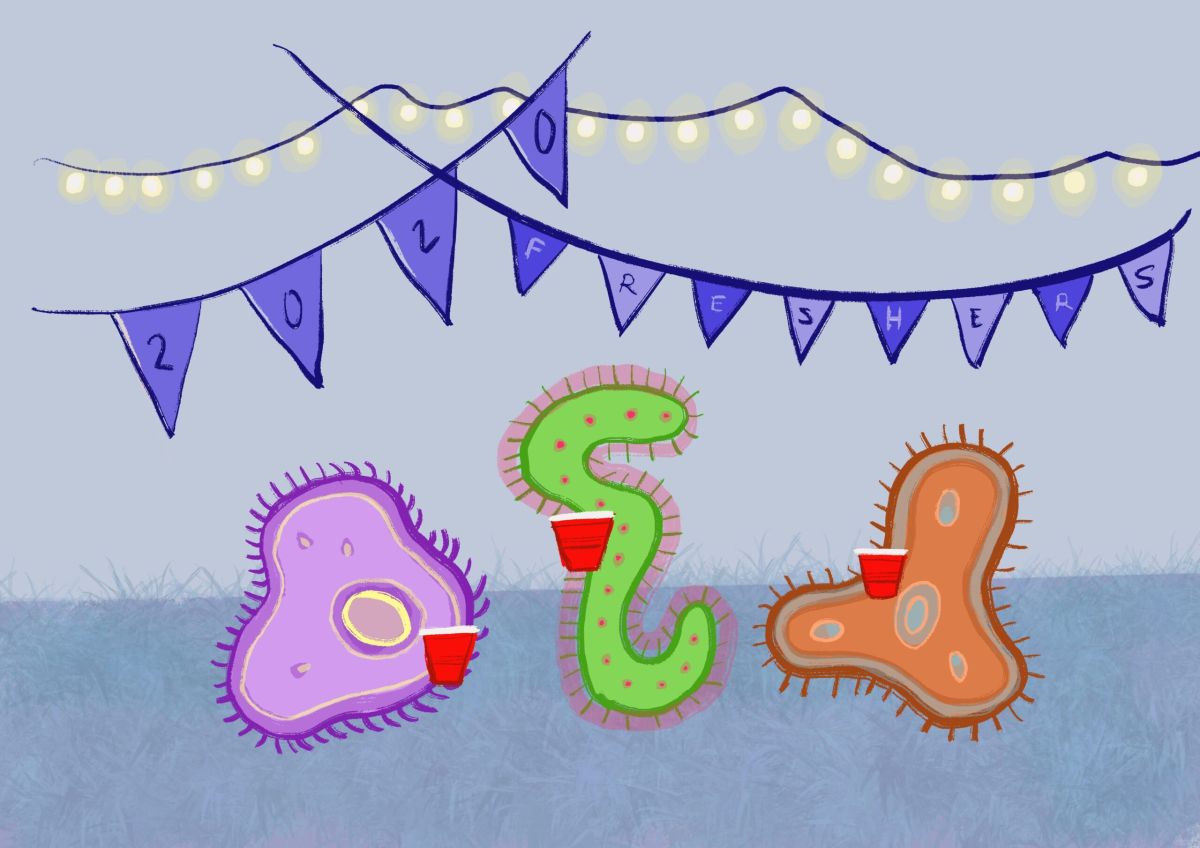The science behind freshers’ flu
By larakenedi

Every single year, new students from all over the world fill up lecture theatres across the campus. They are eager to make new friends, learn more about university life, and live through every experience welcome week has to offer.
Nevertheless, this exciting period can provide opportunities to make acquaintances not only to students, but also to microorganisms.
What is freshers’ flu?
The famous freshers’ flu is generally caused by viruses that provoke respiratory illnesses, such as a sore throat or a continuous cough, often accompanied by a fever.
But despite the name, these are not necessarily influenza (flu) viruses. They are, in fact, uncommon in late September, when freshers’ week usually takes place.
Over 150 viruses dominate the scene at this time, causing mild respiratory illnesses that we know as the common cold. But many of these persist all throughout the year.
So what makes freshers’ flu so special?
There are two major factors that cause so many students to get ill at the same time.
First, the incidence of respiratory infections tend to increase in autumn. This phenomenon is not exclusive to university students, and is the result of spending more time indoors, as well as the weather becoming colder. The cold air dries out mucus membranes, which is the layer of cells and mucous that lines our mouth, nose, and eyes. This tends to make them less effective at fending off pathogens.
Secondly, students bring many different types of pathogens from all over the world. Having never encountered them, freshers do not have a developed immune response thereto.
It is thought that the number of different pathogens, as well as the amount of students that are exposed to them during various events, lead to overwhelming our immune systems.
How do our immune systems really work then?
There are two types of responses of the immune system.
The faster, innate immune response, does its job in a matter of minutes or a few hours. However, the cells that are involved have no memory and can’t distinguish between pathogens. These include cells able to engulf pathogens or infected cells, such as macrophages.
Macrophages are not pathogen-specific, hence will digest any foreign cells they encounter. They are responsible for producing cytokines, a type of signalling molecule that can attract other immune cells. In addition, they display cell-specific surface proteins of the pathogen, that is its antigens, once it is engulfed, which alerts other parts of the immune system.
The second type of immune response is the adaptive immune response. The key players here are T- and B-cells.
T-cells coordinate the immune response and kill infected cells, while B-cells mark them to be destroyed by secreting antibodies. Consequently, these go on to attach themselves to the target cells.
It may, however, take days or even weeks for the adaptive immune response to kick in, as B- and T-cells have to first identify antigens to be able to destroy or mark specific pathogens. Finally, when they recognise a pathogen, T-cells multiply rapidly and trigger other defensive mechanisms.
Are there other contributing factors?
The immune system of younger people tends to be stronger than average, and because of how common these respiratory illness-causing viruses are, we have a herd immunity against many of them.
Nevertheless, one reason why they manage to overwhelm many students’ immune system during the first few weeks may just be the elevated number of pathogens present in the same place.
There may be additional factors that weaken the immune system and make students more vulnerable to developing symptoms.
To no one’s surprise, one such factor is binge drinking alcohol. Large quantities of alcohol consumed in a short amount of time can temporarily reduce the effectiveness of our immune system while the substance has the most effect on our body.
On top of this, alcohol is a diuretic, or a type of substance that makes our body lose more water than normal, leading to dehydration. This can further weaken the immune system: it decreases the volume of blood and lymph, which carry cells involved in immune responses.
By reducing blood volume, alcohol causes blood and lymph to flow slower. As a result, it takes longer for immune-system cells to get to pathogens.
Lack of sleep can have a similar effect, as it reduces the number of cytokines. These play an important role in generating an immune response, as well as regulating the level of antibody response.
Can you get freshers’ flu more than once?
Freshers’ Week provides the perfect climate for all ranges of pathogens to mix and spread.
Essentially, freshers’ flu is the result of our body being weaker than usual, and therefore, more susceptible to illnesses.
Furthermore, it is not caused by just one type of pathogen, but a combination of them, which can make it easy for viruses to take advantage of our weakened bodies.
Immunity differs between pathogens. In most cases, it is unlikely for you to develop symptoms of a disease that you have an elaborated immune response for. However, the existence of different strains of diseases implies that it is possible to contract the same illness twice from two different versions of the pathogen. For instance, there are many strains of coronavirus, but only one strain causes COVID-19.
Viruses can also mutate so that our bodies do not recognise them upon re-infection. Thus, it is indeed possible to get infected multiple times. It is, however, unlikely for our immune systems to be overwhelmed in the same way again because of the unique environment created during the first few weeks of uni.







